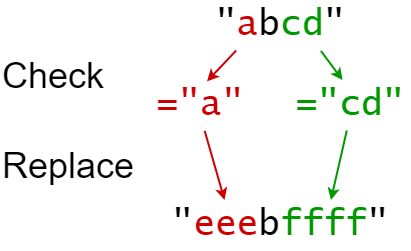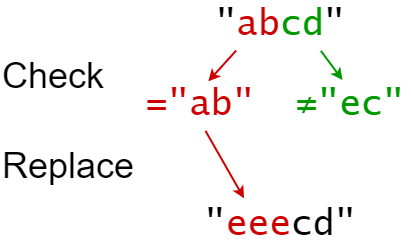你会得到一个字符串 s (索引从 0 开始),你必须对它执行 k 个替换操作。替换操作以三个长度均为 k 的并行数组给出:indices, sources, targets。
要完成第 i 个替换操作:
- 检查 子字符串
sources[i]是否出现在 原字符串s的索引indices[i]处。 - 如果没有出现, 什么也不做 。
- 如果出现,则用
targets[i]替换 该子字符串。
例如,如果 s = "abcd" , indices[i] = 0 , sources[i] = "ab", targets[i] = "eee" ,那么替换的结果将是 "eeecd" 。
所有替换操作必须 同时 发生,这意味着替换操作不应该影响彼此的索引。测试用例保证元素间不会重叠 。
- 例如,一个
s = "abc",indices = [0,1],sources = ["ab","bc"]的测试用例将不会生成,因为"ab"和"bc"替换重叠。
在对 s 执行所有替换操作后返回 结果字符串 。
子字符串 是字符串中连续的字符序列。
示例 1:
输入:s = "abcd", indexes = [0,2], sources = ["a","cd"], targets = ["eee","ffff"] 输出:"eeebffff" 解释: "a" 从 s 中的索引 0 开始,所以它被替换为 "eee"。 "cd" 从 s 中的索引 2 开始,所以它被替换为 "ffff"。
输入:s = "abcd", indexes = [0,2], sources = ["ab","ec"], targets = ["eee","ffff"] 输出:"eeecd" 解释: "ab" 从 s 中的索引 0 开始,所以它被替换为 "eee"。 "ec" 没有从原始的 S 中的索引 2 开始,所以它没有被替换。
提示:
1 <= s.length <= 1000k == indices.length == sources.length == targets.length1 <= k <= 1000 <= indexes[i] < s.length1 <= sources[i].length, targets[i].length <= 50s仅由小写英文字母组成sources[i]和targets[i]仅由小写英文字母组成
方法一:模拟
我们先遍历 indices,对于每个 s[indices[i]: indices[i] + len(sources[i])] == sources[i],则说明 indices[i] 开始的 len(sources[i]) 个字符与 sources[i] 相等,我们记录下标 indices[i] 处需要替换的是 targets[i],否则不需要替换。
然后我们从左到右遍历 targets[d[i]] 加入答案,并且 len(sources[d[i]]) 个字符,否则将 s[i] 加入答案,然后
时间复杂度 indices 和
class Solution:
def findReplaceString(self, s: str, indices: List[int], sources: List[str], targets: List[str]) -> str:
n = len(s)
d = [-1] * n
for i, (j, source) in enumerate(zip(indices, sources)):
if s[j: j + len(source)] == source:
d[j] = i
ans = []
i = 0
while i < n:
if d[i] >= 0:
ans.append(targets[d[i]])
i += len(sources[d[i]])
else:
ans.append(s[i])
i += 1
return ''.join(ans)class Solution {
public String findReplaceString(String s, int[] indices, String[] sources, String[] targets) {
int n = s.length();
int[] d = new int[n];
Arrays.fill(d, -1);
for (int i = 0; i < indices.length; ++i) {
int j = indices[i];
String source = sources[i];
if (s.substring(j, Math.min(n, j + source.length())).equals(source)) {
d[j] = i;
}
}
StringBuilder ans = new StringBuilder();
for (int i = 0; i < n;) {
if (d[i] >= 0) {
ans.append(targets[d[i]]);
i += sources[d[i]].length();
} else {
ans.append(s.charAt(i++));
}
}
return ans.toString();
}
}class Solution {
public:
string findReplaceString(string s, vector<int>& indices, vector<string>& sources, vector<string>& targets) {
int n = s.size();
vector<int> d(n, -1);
for (int i = 0; i < indices.size(); ++i) {
int j = indices[i];
string source = sources[i];
if (s.substr(j, source.size()) == source) {
d[j] = i;
}
}
string ans;
for (int i = 0; i < n;) {
if (d[i] >= 0) {
ans += targets[d[i]];
i += sources[d[i]].size();
} else {
ans += s[i++];
}
}
return ans;
}
};func findReplaceString(s string, indices []int, sources []string, targets []string) string {
n := len(s)
d := make([]int, n)
for i, j := range indices {
source := sources[i]
if s[j:min(j+len(source), n)] == source {
d[j] = i + 1
}
}
ans := &strings.Builder{}
for i := 0; i < n; {
if d[i] > 0 {
ans.WriteString(targets[d[i]-1])
i += len(sources[d[i]-1])
} else {
ans.WriteByte(s[i])
i++
}
}
return ans.String()
}
func min(a, b int) int {
if a < b {
return a
}
return b
}

